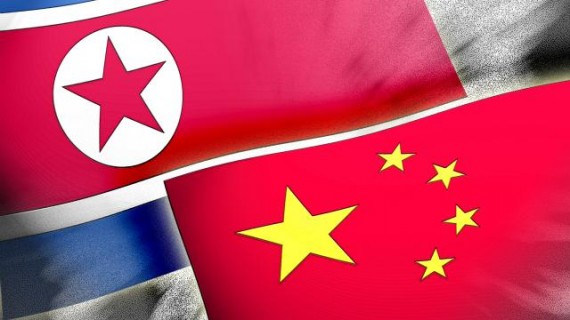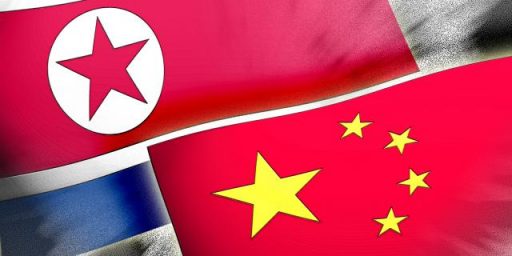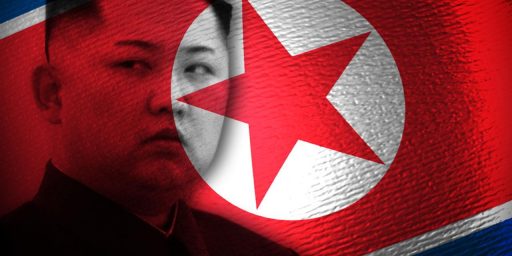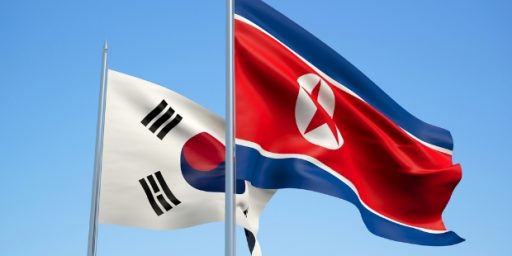China Starting To Get Irritated With North Korea?
North Korea's latest provocations may be testing the patience of their patrons in Beijing.
Over the past several weeks, there’s been increasingly provocative rhetoric coming from the always provocative North Koreans. To the extent that anyone understands what’s actually going on in the world’s most reclusive regime, it’s being taken as a sign that the regime may be preparing for a third underground nuclear test. Supporting that speculation, apparently, are satellite photos that appear to show heavy underground construction in the area what North Korea has tested nuclear weapons before indicative of the preparations for a test. Not surprisingly, this news is causing concern in the United States and South Korea. What’s most interesting, though, is that it seems to be causing North Korea’s patrons in Beijing to become concerned as well:
BEIJING (Reuters) – China expressed serious concern on Wednesday after North Korea stepped up its bellicose rhetoric and threatened to go beyond a third nuclear test in response to what it sees as “hostile” sanctions imposed after a December rocket launch.
“China is extremely concerned by the way things are going. We oppose any behavior which may exacerbate the situation and any acts which are not beneficial towards the denuclearization of the Korean peninsula,” said Foreign Ministry spokeswoman Hua Chunying.
“We call on all the relevant sides to remain calm and exercise restraint and earnestly work hard to maintain peace and stability in the Korean peninsula,” she told a daily news briefing.
China is the North’s sole remaining major diplomatic and economic benefactor but has been showing sings of exasperation with its isolated neighbor.
Additionally, Walter Russell Mead points to an editorial in Global Times, a Communist Party owned tabloid, that, while not official, certainly raises some eyebrows:
Some Chinese scholars believe that China will face a diplomatic challenge if North Korea carries out a third nuclear test. They worry that Pyongyang will turn against China because of China’s participation in some international sanctions against it. In the worst case scenario, the rupture that occurred in relations between China and the Soviet Union will be repeated. Such concerns are driven by a lack of confidence in China’s national strength, and they exaggerate North Korea’s diplomatic irrationality.
The nuclear issue complicates Sino-North Korean relations, adding strategic difficulties to China in Northeast Asia. China has many misgivings when handling relations with Pyongyang, but there is a general principle: China is never afraid of Pyongyang. Pyongyang’s diplomacy is characterized with toughness. But if Pyongyang gets tough with China, China should strike back hard, even at the cost of deteriorating bilateral relations.
Some believe the US, Japan and South Korea are attempting to foment discord between China and North Korea. Such a trap may be real, but China shouldn’t be taken hostage by North Korea’s extreme actions in order to avoid such a trap.
Pyongyang is important to China, but not important enough to make China give up its diplomatic principles. China maintains that denuclearization of the Korean Peninsula is necessary and insists relevant parties solve problems through negotiations. China is willing to maintain the Sino-North Korean friendship, but Pyongyang should do the same. The two should have same concerns over the possibility the relationship might break down, which would be of no benefit to Pyongyang. North Korea would face an even worse situation, but China could find some ways to compensate for geopolitical losses.
(…)
We are not advocating giving up the Sino-North Korean friendship. Instead, we believe the strategic significance of a friendly relationship is special. But Pyongyang shouldn’t misread China. China won’t put its relations with Pyongyang above other strategic interests. China must not fear disputes with Pyongyang if it is to maintain the traditional bond s of friendship
We’re not likely to see China cutting off the North Koreans any time soon, especially since an immediate collapse in Pyongyang would lead to a humanitarian crisis on their southern border and, most likely, a massive refuge crisis that the Chinese would rather avoid if at all possible. At the same time, as Mead notes, increasing belligerence from the North Koreans is the cause of instability on the Korean Peninsula and is also causing both the Japanese and the South Koreans to expand their military, also something that the Chinese would rather avoid if possible. That’s why it’s quite likely that these public statements that we’re seeing from the Chinese, which are far more critical of Pyongyang than we’ve seen in the press, are being accompanied by private statements that are far stronger, with warnings to Kim Jong Un that he best not push the envelope to far or his Chinese patrons may just decide to take matters into their own hands.
The question, of course, is whether Kim and the rest of the North Koreans will listen. In the past, they’ve proven themselves to be quite adept at using these types of crises to get something that they want or need. In this particular case, there have been reports for months now of a renewed famine in the country, likely made worse by the fact that food aid from the west was cut off months ago in response to the country’s most recent provocations. So, it’s possible that what we’re looking at here is the beginning of another manufactured crisis which the North Koreans will attempt to resolve in a manner that gets them food aid, or whatever the heck else it is they might want. Of course, we’ve played this game several times before with the North Koreans and it strikes me that giving in this time would require them to give up something significant, like committing to talks about their nuclear programs that they have so far been unwilling to commit to.
As for the Chinese, well maybe, just maybe, this is a sign that they’ll be willing to nudge their clients







It’s really straightforward cost-benefit analysis. The cost to Beijing of supporting Pyongyang is less that the cost of not supporting Pyongyang, for reasons that you’ve suggested.
North Korea is China’s crazy aunt. It can tolerate the craziness for a long, long time. I don’t know what the limits are but, given the situation in the East China Sea, they’re probably pretty far.
I think Kim believes rattling the cage will get more free food shipments and trinkets for the faithful. Has worked before and nobody really wants to deal with a post-Kim Korea right now.
I don’t think @Dave Schuler is wrong, but I think there’s one more dimension to it… one of these days, when NK finally does collapse under its own weight, what will happen to the North Korean people? The obvious answer would be for them to re-integrate with the South in much the same way East & West Germany did after the Wall came down, but is that really certain? Or even probable? After generations of being told how terrible the Western Powers are, would they instead choose to stream the other direction, into China?
If I were China, I would be looking at anything I could do not to have to absorb a famine-ridden NK populace into my economy…
I also think the Chinese are realizing that peaceful economic growth and rising quality of life is highly desirable. It goes to show that intertwining of economies will, for the most part, lead to a more peaceful and stable world.
When South Korea’s new leader was sworn in, didn’t Kim make a very conciliatory speech, just a couple months ago? I had this vague hope that the younger Kim, educated in Europe, was different than his father and grandfather. I’ve been foiled again.
1-) An editorial in a English language newspaper is not enough to take conclusions about the positions of the Chinese government.
2-) The position of China regarding North Korea has nothing to do with strategic positions or partnerships, but that China does not want a flood of North Koreans refugees going into China.
@legion: Indeed! The problem of a sudden NK collapse revolves around the cost to the ROK of integrating the NK population into the SK economy. A cost that some in Korea estimate to be well in excess of $3 trillion dollars–some of which would come from deflation as the economy abosorbed a population whose annual income is estimated to be only 1-10% of the average in the South.
The possibility of several million refugees streaming across the border for the economic opportunities afforded by being penniless refugees is a genuine threat even without the current provocations factored in. Of course China is worried.
The question for me is whether a soft landing is possible.
Are there organized, competent forces inside NK that can take power from the Kim dynasty and facilitate a transition to a more rational government? We’d better hope so. But what are the odds that in that paranoid police state the kind of organization capable of taking charge can come into being?
More likely is a panic coup. General X sees his own name on a hit list and arrests or simply shoots Kim Jong Un and his 50 closest toadies. But the coup isn’t perfect, it isn’t neat, and a conflict breaks out. That’s your humanitarian disaster right there. The system, such as it is, breaks down, there are no food reserves, no slack of any kind in that society, and starvation appears immediately.
If China is capable of engineering a managed coup that would be great. Great for the people of NK, great for SK, great for China and great for us. Big “if.”
@Andre Kenji: indeed China wants to avoid a flooding of immigrants, however, the border security has been tighter recently than ever before. In the late 80’s Zhang Dejiang who had been educated in Pyongyang, solved the illegal immigration problem. It is the reason he is in the Central Committee and it is his job to normalize relations with the North Koreans. China is more dedicated to stability than any country which makes this rhetoric likely just that. They will try and keep the status quo at least in the short term as Xi tries his damnedest at modest reforms in China itself to calm the citizens down.
@michael reynolds: The possibility for a coup ended the day day Kim Jong Un took power. The head of the army marched on Pyongyang after orders to turn around and stop. And Kim’s uncle and most trusted adviser had him and the rest of the dissenters killed. As for the Chinese purposely bringing down the Kim regime, that is very unlikely. China wants stability. The area stirring up the pot the most in the region is South Korea, who a few years ago drastically reduced the aid they send the north. And at the same time started collecting a separate tax to pay for the costs of the eventual reunification. It is a troubling region that has at most 25 years to keep this charade up.
FWIW, here in Shanghai, on the rare occasion NK comes up at all with my Chinese colleagues, they “know” that a) The North Koreans will come across the border to China if there is collapse of the regime and b) China is trying to tighten up the border.